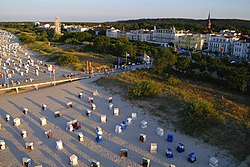

The following is a list of spa towns in Germany . The word Bad (English: bath) is normally used as a prefix (Bad Vilbel) or a suffix (Marienbad, Wiesbaden) to denote the town in question is a spa town. In any case, Bad as a prefix is an official designation and requires governmental authorization (which may also be suspended if a town fails to maintain the required standards).
Contents
The word Kurort is also used, meaning a place for a cure. However not all Kurorte are spa towns; there are also Kurorte which are visited for their pure air ( Luftkurorte , for example).
This list is alphabetical, the states of the spa towns are added, as well as their official German category designation (Heilbad, Seebad etc.).
For seaside resorts, see List of seaside resorts in Germany.